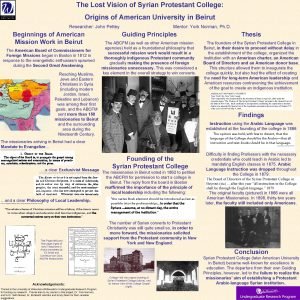The Lost Vision of Syrian Protestant College Origins

- Slides: 1

The Lost Vision of Syrian Protestant College: Origins of American University in Beirut Researcher: John Pettey Beginnings of American Mission Work in Beirut The American Board of Commissioners for Foreign Missions began in Boston in 1812 in response to the evangelistic enthusiasm spawned during the Second Great Awakening. Reaching Muslims, Jews and Eastern Christians in Syria (including modern Jordan, Israel, Palestine and Lebanon) was among their first goals, and the ABCFM sent more than 150 missionaries to Beirut and the surrounding area during the Nineteenth Century. Mentor: York Norman, Ph. D. Guiding Principles Thesis The ABCFM (as well as other American mission agencies) held as a foundational philosophy that successful mission work would result in a thoroughly indigenous Protestant community gradually making the presence of foreign missionaries unnecessary. This was considered a key element in the overall strategy to win converts. The founders of the Syrian Protestant College in Beirut, in their desire to proceed without delay in the establishment of the college, organized the institution with an American charter, an American Board of Directors and an American donor base. This structure allowed them to inaugurate the college quickly, but also had the effect of creating the need for long-term American leadership and American resources contravening the achievement of the goal to create an indigenous institution. AMERICAN UNIVERSITY OF BEIRUT New York City, New York County This corporation was incorporated by the Secretary of State on April 24, 1863 under the corporate name “The Trustees of The Syrian Protestant College” pursuant to the General Laws of the State of New York. Such certificate of incorporation constituting the corporation’s absolute charter was amended by Special Act of the Legislature pursuant to the provisions of Chapter 579 of the Laws of 1864 on May 4, 1864. Findings Instruction using the Arabic Language was established at the founding of the college in 1866 The opinion was held, with few to dissent, that the language of the College should be the Arabic—that all instruction and text-books should be in that language. The missionaries arriving in Beirut had a clear Mandate to Evangelize… Daniel Bliss, First President of SPC from the Laws and Regulation of the ABCFM …a clear Exclusivist Message from a sermon delivered to the ABCFM at their annual meeting by Timothy Dwight, President of Yale College. …and a clear Philosophy of Local Leadership. From a magazine article by Henry Jessup, Missionary to Beirut for 53 years “The whole scheme of Christian missions will be a failure, if the time is never to come when religion and education shall become indigenous, and the converted natives carry on their own institutions. ” Title Page (left) and final page (right) of New Testament in Arabic translated by Eli Smith and Cornelius Van Dyck, ABCFM Missionaries. Acknowledgements: Thanks to the University of Wisconsin-Whitewater’s Undergraduate Research Program for funding my research. Thanks also to my mentor in this project, Dr. York Norman, and to Dr. Seth Meisel, Dr. Elizabeth Hachten and Emily Zeien for their valuable suggestions. Founding of the Syrian Protestant College The missionaries in Beirut voted in 1862 to petition the ABCFM for permission to start a college in Beirut. The reply from the board in Boston reaffirmed the importance of the principle of local leadership including the following: “the native Arab element should be introduced as fast as possible into the professorships…in order that the Syrians …assume, at no distant day, the entire management of the institution. ” Difficulty in finding Professors with the necessary credentials who could teach in Arabic led to mandating English classes in 1875. Arabic Language Instruction was dropped throughout the College in 1879. The Board of Directors of the Syrian Protestant College at Beyrout (sic) …after this year “all instruction in the College shall be through the English language. ” 1879 The original faculty (pictured) in 1866 were all American Missionaries. In 1898, thirty-two years later, the faculty still included only Americans. The number of Syrian converts to Protestant Christianity was still quite small so, in order to move forward, the missionaries solicited support from the Protestant community in New York and New England. Conclusion College Hall, the original building of Syrian Protestant College (above), and an interior view of the College Chapel (right). Syrian Protestant College (later American University in Beirut) became well-known for excellence in education. The departure from their own Guiding Principles, however, led to the failure to realize the missionaries’ aim of establishing a Protestant Arabic-language Syrian institution. .

